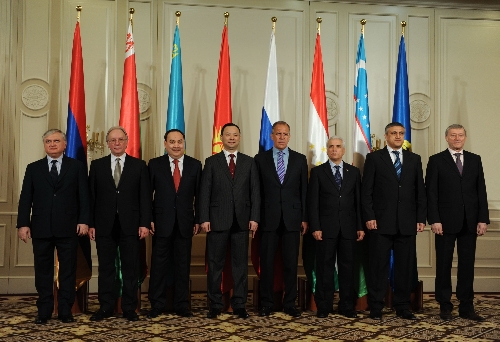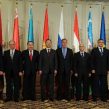
CSTO Proposes Cooperation with NATO on Afghanistan
Publication: Eurasia Daily Monitor Volume: 9 Issue: 71
By:

Moscow has again proposed formal multilateral cooperation with NATO. On April 6, Russian Foreign Minister Sergei Lavrov arrived in Astana to attend the council of foreign ministers of the Collective Security Treaty Organization (CSTO), ahead of the CSTO summit in Moscow on May 15. Lavrov said that Moscow initiated a declaration of the CSTO foreign ministers calling for interaction on Afghanistan between the CSTO and NATO. Lavrov noted that the CSTO has previously called for such cooperation with the Alliance, but the recent “unification of efforts” in this direction had triggered a fresh attempt (Krasnaya Zvezda, April 6).
There is little surprise in an offer to cooperate with NATO to stem the potential threats related to drug trafficking and combating terrorism emanating from Afghanistan, particularly in view of the NATO withdrawal from the country in 2014. Equally, Moscow is familiar with the wall of silence on the issue from Brussels, aware that the new NATO members are reluctant to agree to arrangements that perhaps signal recognition by the Alliance of Moscow’s “sphere of privileged interests.” However, as in the previous efforts by the CSTO to engage NATO on Afghanistan, the latest declaration received support from all its members (Armenia, Belarus, Kazakhstan, Kyrgyzstan, Russia, Tajikistan and Uzbekistan). The explanation for the renewed effort to build such cooperative dynamics with NATO lies in a deep strategic evolution that is underestimated in NATO capitals (Interfax, April 6).
Moscow has a vested interest in opposing the expansion of NATO’s interests in the strategically important Central Asia, long resisting the US basing strategy in the region, and expressing concern about the activities of the Alliance and its members. Russia’s 2010 military doctrine ascribes pole position to NATO as a danger to the Russian Federation, specifically the enlargement of the Alliance and its interest in out of area operations, which complicates Moscow’s defense planning (www.kremlin.ru, February 5, 2010). Yet, more recently, Moscow has found unexpected complications in its close defense relations with Kyrgyzstan and Tajikistan linked to requests for payment for its basing policy in each country. As Aleksei Nikolski, the defense correspondent for Vedomosti, noted in a recent article on the issue, Moscow is adjusting to the idea that if it wants close security cooperation with its Central Asian neighbors then Russia must pay for it (Vedomosti, March 30).
Nonetheless, the drivers behind the latest CSTO offer are not only about Moscow seeking to reclaim its leadership role in the organization, but are linked to the Kremlin’s aspirations for its future development. The transformation of the CSTO began in late 2008 with Astana’s proposal to form a new Collective Rapid Reaction Force (Kollektivnye Sil Operativnogo Reagirovaniya –KSOR), which consists mainly of Russian and Kazakhstani elite military units, staging annual exercises, investing in new weapons and equipment, as well as having a much wider mandate for regional intervention to include domestic crises, natural and man-made disasters, or emergency situations. In the long-term defense agenda delineated by Prime Minister Vladimir Putin prior to his presidential election victory in March, the further strengthening of the CSTO was clearly advanced as a priority. Moreover, Russia’s evolving Aerospace Defense Forces (Vozdushno Kosmicheskaya Oborona – VKO) will further involve strengthening air defense bilaterally with Kazakhstan (Interfax, December 30, 2008; Rossiyskiya Gazeta, February 20). Moscow also sets the tone for the extent to which its allies cooperate with NATO, most recently agreeing to host the NATO base in Ulyanovsk for the transit of non-lethal supplies by non-military personnel (Interfax, April 5).
Russian Defense Minister Anatoliy Serdyukov has noted that a program is being prepared and will be approved by December 1, 2012 to strengthen and equip KSOR with state-of-the-art weapons. Serdyukov said that this will be reviewed and further adjusted on the basis of five year planning cycles (Krasnaya Zvezda, March 30).
Moscow also appreciates the fact that the CSTO is a high priority in the defense and security policies of other member states. Kazakhstan’s new military doctrine, signed by President Nursultan Nazarbayev on October 11, 2011, ascribes great importance to the role played by the CSTO in promoting security in Central Asia, and specifically underscores its commitment to strengthen and play an active role in KSOR (www.mod.kz, accessed April 9).
Kazakhstan currently holds the rotating chairmanship of the CSTO and considers that organization is developing to meet modern threats and challenges. Kazakhstan’s Foreign Minister Yerzhan Kazykhanov explained on April 6 that the CSTO is actively developing cooperation between its members on information security and emergency response. Kazykhanov added, “We are calling for the potential of this organization as an authoritative international structure on the Eurasian continent to be further developed and strengthened.” Among the numerous joint action planned by the CSTO, according to Kazykhanov, security will be tightened on the Tajik-Afghan border ahead of the NATO withdrawal from Afghanistan (Interfax, April 6).
NATO still prefers to deal with the CSTO members on a bilateral basis, and thus avoid entering any formal relationship with the organization, despite the UN recognition of the CSTO and the latter’s cooperation with the Shanghai Cooperation Organization (SCO). Yet, even on a bilateral basis, NATO has had its wings clipped in its defense cooperation arrangements with key Central Asian CSTO members such as Kazakhstan; Astana no longer discusses its Navy with the Alliance, among other issues, while openly and readily cooperating with Moscow in the most sensitive security areas (Author discussions with NATO officials, November 28-29, 2011).
In this sense it is interesting to note that the CSTO offers to cooperate on Afghanistan with NATO, as well as to act jointly in response to natural and manmade disasters, which fits the pattern of missions assigned to KSOR. The CSTO also proposes that NATO should help to “ensure the security and evacuation of representation offices and citizens of member states of these organizations during crisis situations,” adding that CSTO members are prepared to “fine tune” cooperation with NATO in “areas of mutual interest”(Interfax, April 6).
The latest effort to initiate CSTO-NATO cooperation may not yield any breakthrough, but the options for NATO in Central Asia are narrowing, while all sides are considering the strategic implications of interaction with arguably a weakened Alliance after 2014. In this context, defense planners in each CSTO capital are taking the organization much more seriously; only Tashkent chooses to remain aloof from this transformation process.




